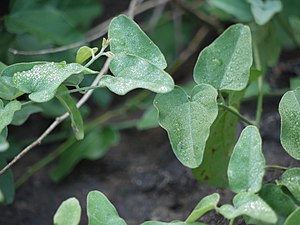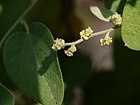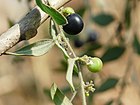Note: This is a project under development. The articles on this wiki are just being initiated and broadly incomplete. You can Help creating new pages.
Difference between revisions of "Cocculus hirsutus - Patalagarudi"
(→Identification) |
(→References) |
||
| Line 80: | Line 80: | ||
<references> | <references> | ||
| − | <ref name="Uses">[https://easyayurveda.com/2015/03/10/patala-garudi-cocculus-hirsutus-uses-dose-research/ | + | <ref name="Uses">[https://easyayurveda.com/2015/03/10/patala-garudi-cocculus-hirsutus-uses-dose-research/ Uses]</ref> |
| − | <ref name="Chemical composition">[http://gbpihedenvis.nic.in/PDFs/Glossary_Medicinal_Plants_Springer.pdf | + | <ref name="Chemical composition">[http://gbpihedenvis.nic.in/PDFs/Glossary_Medicinal_Plants_Springer.pdf Chemical composition]</ref> |
| − | <ref name="Leaf">[http://FLOWERING PLANTS OF KERALA VER.2, N. Sasidharan | + | <ref name="Leaf">[http://FLOWERING PLANTS OF KERALA VER.2, N. Sasidharan BOTANIC DESCRIPTION]</ref> |
| − | <ref name="Common names">[http://envis.frlht.org/bot_search | + | <ref name="Common names">[http://envis.frlht.org/bot_search Vernacular names]</ref> |
Revision as of 13:14, 17 April 2020
Patalagarudi is a slender climber with soft hairy leaves. This plant can be found in dry areas during and after the monsoon.
Contents
- 1 Uses
- 2 Parts Used
- 3 Chemical Composition
- 4 Common names
- 5 Properties
- 6 Habit
- 7 Identification
- 8 List of Ayurvedic medicine in which the herb is used
- 9 Where to get the saplings
- 10 Mode of Propagation
- 11 How to plant/cultivate
- 12 Commonly seen growing in areas
- 13 Photo Gallery
- 14 References
- 15 External Links
Uses
Aphrodisiac, Burning sensation, Gastritis, Skin diseases, Poisoning [1]
Parts Used
Bark, Leaves, Heartwood, Seeds
Chemical Composition
The stem contains cyclopeptide alkaloids. The plant contains coclaurine, magnoflorine, beta-sitosterol, ginnol and a monomethyl ether of inositol. [2]
Common names
| Language | Common name |
|---|---|
| Kannada | Aadama balli, Adambuballi, Daagadiballi, Kaage maari, Sugadi balli |
| Hindi | Bajar bel, Jamti-ki-bel, Patal garudi |
| Malayalam | Pathalagarudakkodi |
| Tamil | Anantavalli, Calakattu, Kattukkodi, Nirppantikkoti, Uppaittiricci |
| Telugu | Cheepurutheega, Chipurutige, Doosaratheege |
| Marathi | NA |
| Gujarathi | NA |
| Punjabi | NA |
| Kashmiri | NA |
| Sanskrit | Garudi, Chilahinta, Vatsadani, Vikranta |
| English |
Properties
Reference: Dravya - Substance, Rasa - Taste, Guna - Qualities, Veerya - Potency, Vipaka - Post-digesion effect, Karma - Pharmacological activity, Prabhava - Therepeutics.
Dravya
Rasa
Tikta (Bitter)
Guna
Laghu (Light), Picchila (Sticky)
Veerya
Ushna (Hot)
Vipaka
Katu (Pungent)
Karma
Vata, Pitta,Kapha
Prabhava
Vishagna (Anti-poison)
Habit
Identification
Leaf
| Kind | Shape | Feature |
|---|---|---|
| Simple | Alternate | 1.5-7 x 0.5-4.7 cm, variable in shape, the lower leaves of the main branches larger, sometimes 3-5 lobed. |
Flower
| Type | Size | Color and composition | Stamen | More information |
|---|---|---|---|---|
| Unisexual | Axillary | Greenish yellow | Male flowers: sepals greenish, pilose, 3 inner broadly ovate to obovate, 1.5-2.5 mm long. |
Fruit
| Type | Size | Mass | Appearance | Seeds | More information |
|---|---|---|---|---|---|
| A drupe | 4 - 8mm | Turning black, 4-8 mm diam.; endocarp ridged with a prominent do | {{{5}}} | {{{6}}} |
Other features
List of Ayurvedic medicine in which the herb is used
Where to get the saplings
Mode of Propagation
How to plant/cultivate
Season to grow
Soil type
Propagation
Commonly seen growing in areas
Photo Gallery
References
External Links
- Ayurvedic Herbs known to be helpful to treat Aphrodisiac
- Ayurvedic Herbs known to be helpful to treat Burning sensation
- Ayurvedic Herbs known to be helpful to treat Gastritis
- Ayurvedic Herbs known to be helpful to treat Skin diseases
- Ayurvedic Herbs known to be helpful to treat Poisoning
- Herbs with Bark used in medicine
- Herbs with Leaves used in medicine
- Herbs with Heartwood used in medicine
- Herbs with Seeds used in medicine
- Herbs with common name in Kannada
- Herbs with common name in Hindi
- Herbs with common name in Malayalam
- Herbs with common name in Tamil
- Herbs with common name in Telugu
- Herbs with common name in Sanskrit
- Habit - Climber
- Index of Plants which can be propagated by Seeds
- Index of Plants which can be propagated by Cuttings
- Herbs that are commonly seen in the region of Tropical area
- Herbs
- Climber
- Ayurvedic herbs that don't have seed photos
- Menispermaceae




